
Dennis Nicolaas Maria Bergkamp is a Dutch professional football coach and former player who was most recently the Assistant manager of Ajax. Originally a wide midfielder, Bergkamp was moved to main striker and then to second striker, where he remained throughout his playing career. He is widely regarded as one of the greatest players of his generation, one of the greatest forwards in Premier League history and amongst Ajax's and Arsenal's greatest ever players.
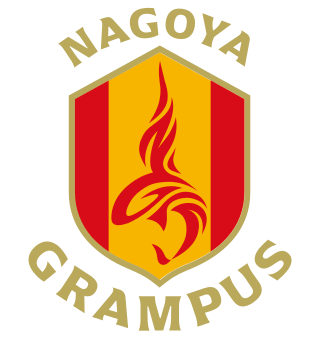
Nagoya Grampus; formerly known as Nagoya Grampus Eight is a Japanese association football club that plays in the J1 League, and have for all but one season since the inauguration of the league, following promotion from the J2 League in 2017.
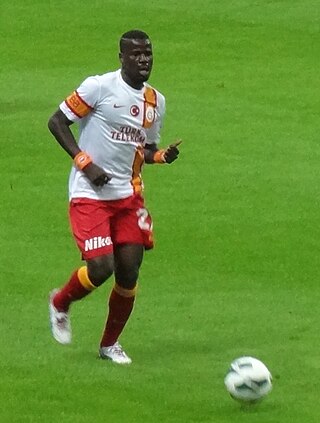
Emmanuel Eboué is an Ivorian former professional footballer who played as a right back.

David Barry Dein is a British businessman, known for being a former co-owner and vice-chairman of Arsenal Football Club, and founding the Premier League.
Stewart Ian Robson is an English former football player and TV and radio football pundit. He played for Arsenal, West Ham United where he was their player of the season in 1988, and Coventry City. After his footballing career ended he took on a role as a TV and radio pundit for Arsenal TV until 2012, ESPN, TalkSPORT and TNT Sports. He is currently ESPN's lead color commentator for FA Cup and EFL Cup working alongside Jon Champion and Martin Tyler, and Bundesliga with Derek Rae, who he also provides commentary alongside in the FIFA/EA FC video game series since 2021.
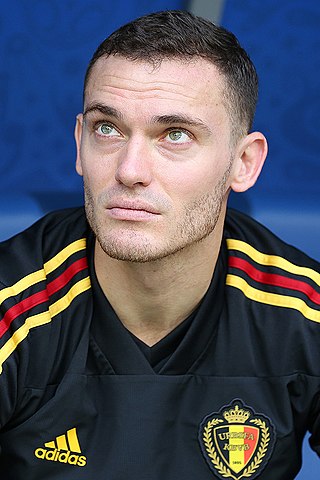
Thomas Vermaelen is a Belgian former professional footballer. Being left-footed, he usually played as a left-sided centre-back and could play at left-back as well. His key attributes included aerial ability, leadership skills, and his quickness with the ball at his feet. He was also known for his goalscoring ability as a defender.
In English football, "The Invincibles" is a nickname used to refer to the Preston North End team of the 1888–89 season, managed by William Sudell, and the Arsenal team of the 2003–04 season managed by Arsène Wenger. Preston North End earned the nickname after completing an entire season undefeated in league and cup competition, while Arsenal were undefeated in the league in a run that stretched to a record 49 games. The actual nickname of the Preston team was the "Old Invincibles" but both versions have been in use although Arsenal is the only team to ever finish a 38-match season undefeated.

Jack Andrew Garry Wilshere is an English football coach and former professional player who played as a midfielder. He is the head coach of the Arsenal under-18 team.

The 2009–10 season was Arsenal Football Club's 18th season in the Premier League and their 84th consecutive season in the top flight of English football. It began on 1 July 2009 and concluded on 30 June 2010, with competitive matches played between August and May. The club ended the Premier League campaign in third position, 11 points behind champions Chelsea. In the domestic cup competitions, Arsenal were knocked out in the fourth round of the FA Cup to Stoke City and the fifth round of the League Cup against Manchester City. They failed to progress past the quarter-finals of the UEFA Champions League, losing to reigning champions Barcelona in a two-legged tie.

Although Arsenal and Manchester United have frequently been in the same division in English football since 1919, the rivalry between the two clubs only became a fierce one in the late 1990s and early 2000s, when the teams regularly competed against each other for the Premier League title and FA Cup. There was also an enmity between the managers, Arsenal's Arsène Wenger (1996–2018) and United's Sir Alex Ferguson (1986–2013), and club captains Patrick Vieira and Roy Keane, and their contests often involved on-field trouble – seven red cards were shown in matches from February 1997 to February 2005. The league fixture in September 2003, known as the "Battle of Old Trafford", was marred by a mêlée instigated by Arsenal players, who felt striker Ruud van Nistelrooy had cheated to get Vieira sent off. A season later, Manchester United ended Arsenal's unbeaten run in controversial circumstances, which led to more disorder, this time in the tunnel. Manchester United lead in trophies won with 67 honours compared to Arsenal's 48.
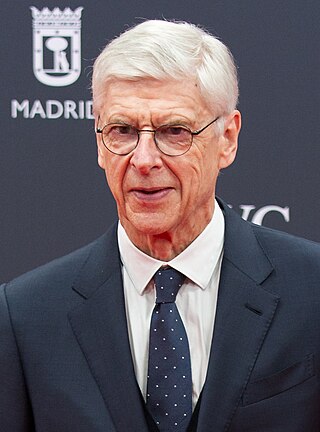
Arsène Charles Ernest Wenger is a French former football manager and player who is currently serving as FIFA's Chief of Global Football Development. He was the manager of Arsenal from 1996 to 2018, where he was the longest-serving and most successful in the club's history. His contribution to English football through changes to scouting, players' training and diet regimens revitalised Arsenal and aided the globalisation of the sport in the 21st century.

Wojciech Tomasz Szczęsny is a Polish professional footballer who plays as a goalkeeper for Serie A club Juventus and the Poland national team.
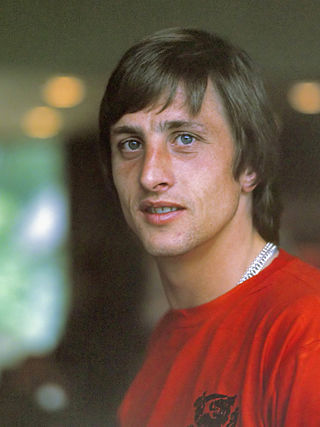
Hendrik Johannes Cruijff, commonly known as Johan Cruyff, was a Dutch professional football player and manager. Regarded as one of the greatest players in history and as the greatest Dutch footballer ever, he won the Ballon d'Or three times, in 1971, 1973, and 1974. Cruyff was a proponent of the football philosophy known as Total Football developed by Rinus Michels, which Cruyff also employed as a manager. Because of the far-reaching impact of his playing style and his coaching ideas, he is widely regarded as one of the most influential figures in modern football, and he is also regarded as one of the greatest managers of all time.

Smoking in India is one of the oldest industries and provides employment to more than five million people directly and indirectly. India is the second-largest producer of tobacco in the world. Smoking has been known since at least 2000 BC when cannabis was smoked and is first mentioned in the Atharvaveda. Fumigation (dhupa) and fire offerings (homa) are prescribed in the Ayurveda for medical purposes and have been practiced for at least 3,000 years while smoking, dhumrapana has been practiced for at least 2,000 years. Tobacco was introduced to India in the 17th century. It later merged with existing practices of smoking.

The 2013–14 season was Arsenal Football Club's 22nd season in the Premier League and 88th consecutive season in the top flight of English football. Arsenal participated in the Premier League, FA Cup, League Cup and the UEFA Champions League, after finishing fourth in the previous Premier League season. Despite an opening day 1–3 league defeat at home to Aston Villa, which exacerbated underlying anger at the club's inactivity in the transfer market, Arsenal's league campaign got off to a strong start. Early pace-setters in the title race, Arsenal led the table for much of the season, spending more time on top of the league than any other side. However, a combination of injuries to key players and heavy defeats away from home against other title challengers saw the Gunners' title ambitions evaporate by late March. Nonetheless, Arsenal achieved success in the FA Cup with a dramatic 3–2 win over Hull City in the 2014 Final, ending a nine-year trophy drought.

The 2009 Emirates Cup was a pre-season football friendly tournament hosted by Arsenal at its home ground, the Emirates Stadium. It was the third Emirates Cup, an invitational competition inaugurated in 2007. Held on the weekend of 1–2 August 2009, the participants were Arsenal, Atlético Madrid, Rangers, and Paris Saint-Germain.

The 2014 FA Community Shield was the 92nd FA Community Shield, an annual English football match played between the winners of the previous season's Premier League and FA Cup. The game was played between Arsenal, who beat Hull City in the final of the 2013–14 FA Cup, and Manchester City, champions of the 2013–14 Premier League. Watched by a crowd of 71,523 at Wembley Stadium in London, Arsenal won the match 3–0.
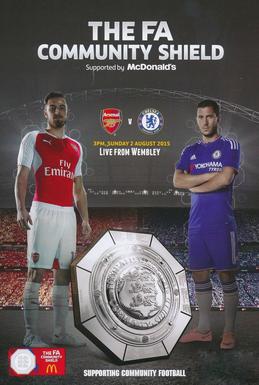
The 2015 FA Community Shield was the 93rd FA Community Shield, an annual English football match played between the winners of the previous season's Premier League and FA Cup. The match was contested by Arsenal, the 2014–15 FA Cup winners, and Chelsea, champions of the 2014–15 Premier League. It was held at Wembley Stadium on 2 August 2015. Watched by a crowd of 85,437 and a television audience of over a million, Arsenal won the match 1–0.

A vape shop is a retail outlet specializing in the selling of vaping products, though shops selling derived psychoactive cannabis products have increased in the United States since the passage of the 2018 Farm Bill. There are also online vape shops. A vape shop offers a range of vaping products. The majority of vape shops do not sell vaping products that are from "Big Tobacco" companies. In 2013, online search engine searches on vape shops surpassed searches on e-cigarettes. Around a third of all sales of vaping products in one US state took place in vape shops. Big Tobacco believes the independent vape market is a threat to their interests.

The Arsenal F.C.–Manchester City F.C. rivalry is a rivalry between English professional football clubs Arsenal and Manchester City. Arsenal play their home games at the Emirates Stadium, while Manchester City play their home games at the City of Manchester Stadium.





















